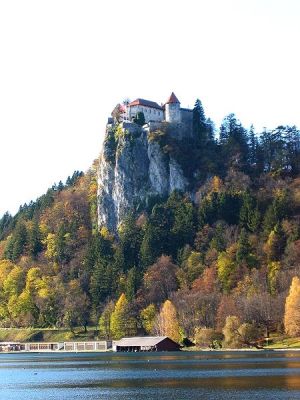We’re 50 kilometers outside of Ljubljana, Slovenia, in Bled Castle, overlooking a clear blue mountain lake, a set of gilded clouds scudding overhead and the sun is shining bright over miles of untrammeled forests. On the water below tiny swimmers look as if they’re floating in thin air, arms and legs swinging, making ripples in something invisible.
We’re also fifty kilometers from a hotbed of entrepreneurial energy and a further 400 kilometers from another hotbed of entrepreneurial energy and, further down the Adriatic coast, another hotbed. And another. And another. In short, something is happening in the Balkans.
Countries like Croatia and Bulgaria have long been parts of the outsourcing economy. Now those same outsourcers and hackers have become part of a burgeoning startup scene that is slowly diverting talent from Citibank cubicle farms and into wide-open lofts where The Lean Startups is a holy book and cargo shorts are the new khakis and a button down.
I spent a week in four cities in the region – Sofia, Belgrade, Zagreb, and Ljubljana – and, while that’s not nearly enough time to come back an expert, I thought it would be good to address what I saw and where I see the region in the startup ecosystem.
First, let’s get some of the examples out of the way. One of my favorite Kickstarter projects, Lumu came out of Slovenia as does Outfit 7, creators (for better or worse) Talking Tom.
Croatia has Sqee and the floating Hypersphere and is home to Netokracija, the TechCrunch of the region. Belgrade has 58 companies on Angellist. Sofia has two major accelerators, Eleven and LAUNCHub and solid tech chops. They even have their own Tesla.
There are a few real, Skype-level successes and they’re mostly in the services/ecommerce/B2B space. However, in the strange calculus that defines a region’s buzz, I think it’s the B2C players who are really worth a look simply because they prove that the energy is expressing itself in previously unknown ways. In fact, there is so much buzz that the ecosystem supports a whole sub-class of entrepreneurs who are just excited about building something.
Years of outsourcing prowess has built this environment and it’s paying dividends. If there isn’t a Skype-level success out of the southern central European market in the next year or so, I’d be surprised. In fact, given the potential for EU investment and the growth of solid social infrastructure and ecommerce platforms in the area, one of the local lads or lasses could hit it big.
I rarely, if ever, like to write gushing travelogues on the places we visit. I consider the startup ecosystem to be a global one and regional differences are best left to the strident and political. However, I came away impressed. The area now has its own startup conference and a number of groups that are working hard to extricate capital out of investment hubs around the world. Businesses are quick to grasp the potential of crowdfunding, they can make hardware and software, and they already have solid contacts in the Valley and NY.
Perhaps they were pulling the wool over my eyes and their world is a Potemkin village full of drudgery and COBOL. But I don’t think so. I’ve seen northern markets grow by leaps and bounds over the past few years – our first TechCrunch “mini meetup” in Poland seven years ago consisted of five dudes at a pub, one of whom was convinced I was a Ponzi scheme salesman. Now, Startup events regularly draw thousands – and it’s time for the southern states to step up. The crisis, if it can be said there is one in most of Europe, has given graduates the impetus to forego a career in finance or IT and instead focus on growth areas. The result is a clear movement towards a more experimental and, yes, sometimes immature, mode of business. But it can only get better.
This is a hard road. Not every investment is a smart one and there are already bubbles popping up. Outsourcing prowess does not translate directly to the ability to interact on a global scale. It simply offers a way forward for programmers stuck in the grind.
If I were running a startup in Europe, I’d seriously consider the SEE as a development base. I was speaking to a Zurich-born exec during his company party. There was a crepe-making machine plopping out snacks and a kiddie pool full of beers with openers hanging from the trees. He told me that he tried to outsource to the U.S. – somewhere in Illinois or Wisconsin – but decided on Slovenia. It was a few hours away, in the same time zone, and, most startlingly, the red-tape and bureaucracy involved in outsourcing a project and building an office in the U.S. was far too messy.
That’s right: a Swiss national living in former Yugoslavia found the business climate in the U.S. to be a little too overbearing. How things have changed. Plus he liked the hiking and biking and castle exploring available in what amounts to an untrammeled natural wonderland. If I were a programmer with a good idea in need of talent, I’d be on the first plane with my mountain bike in tow.
Again, it’s a small sample and one nice afternoon talking startups in the courtyard of a thousand-year-old castle doesn’t make a statistically significant conclusion. But the Balkans, and this isn’t the Croatian wine talking, are going to be big. How big, however, is up to men and women in the trenches building their ideas.
